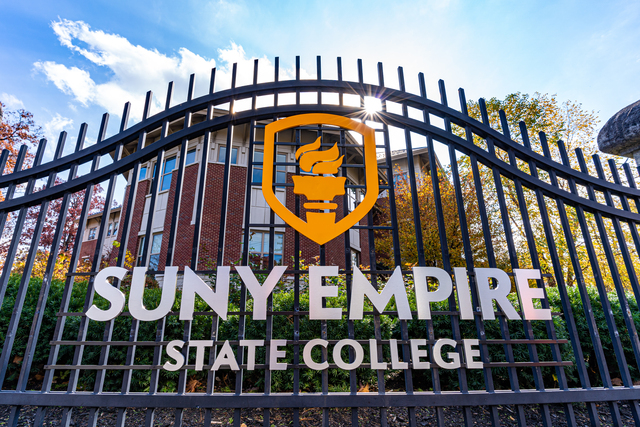August 11, 2020
SUNY Empire State College Launches First-in-the-Nation Program to Recognize Indigenous Knowledge as Pathway to College Credit, Creates New Global Indigenous Knowledge Certificate
Certificate Will Address Indigenous Issues and Perspectives in Modern Social Justice Movements, Enhance Cross-Cultural Communication Skills
Program is Available 100% Online and Enrollment is Open for Fall 2020

(SARATOGA SPRINGS, NEW YORK – August 11, 2020) SUNY Empire State College today announced it will offer college credit for Indigenous learning gained through work and life experience using its Prior Learning Assessment process, making it the first college in the nation to broadly recognize Indigenous learning – such as native languages or religion – as a pathway to college credit. SUNY Empire also accepts traditional transfer credits from other colleges and universities, which students use to complete their degree or certificate faster and at lower cost.
SUNY Empire also announced a new certificate in global Indigenous knowledge (GIK) a 16-credit program that explores ancient beliefs, historical narratives, and current social justice issues around the world from the perspective of Indigenous peoples. Courses in the new certificate examine native cultures from Africa, the Americas, and throughout the world, immersing students in tribal arts, music and dance, spirituality, storytelling, teachings, and traditions.
The program will address modern diversity, equity, and inclusion concerns, and help students enhance their cross-cultural communication skills. This deeper understanding and awareness will benefit professionals in a broad variety of fields, including social services, healthcare, education, and non-governmental organizations. Students will also study environmental sustainability through the lens of Indigenous practices surrounding natural resource management.
The GIK certificate, which is overseen by SUNY Empire State College Associate Professor Rhianna C. Rogers and Associate Professor Menoukha Case, was inspired by Karyl Denison “KD” Eaglefeathers, an associate professor of community and human services at SUNY Empire, who passed away in 2012. She made significant contributions to the preservation of the folklore and culture of New York state, and the Catskill Mountains, and was committed to the restoration of sacred languages and cultures.
“The new global Indigenous knowledge certificate at SUNY Empire comes at a critical time as we collectively confront the injustices, prejudices, and inequities of our society and institutions,” said SUNY Empire State College President Jim Malatras. “Our Indigenous communities play an important role in this movement as we answer the call to do better. I’m proud that SUNY Empire is elevating Indigenous knowledge and providing opportunities for a deeper understanding of these issues. Thank you to Professors Rogers and Case for continuing the impactful work of KD Eaglefeathers and for honoring her legacy.”
“We commend SUNY Empire State College for acknowledging with college credit the valuable educational contributions that indigenous New Yorkers pass from generation to generation,” said Office of Children and Family Services Director of Native American Services Heather LaForme. “This certificate brings new opportunity to tribal nations and brings us a step closer to the equity that Indigenous communities and native nations have long sought, continue to seek, and most richly deserve.”
“Professor KD Eaglefeathers’ work with the Northern Cheyenne led to a dedication to preserving Indigenous cultures,” said Clifford Eaglefeathers, former SUNY Empire State College adjunct professor. “She felt SUNY Empire should take the initiative of working with Indigenous peoples and offer distance learning to tribal colleges. The global Indigenous knowledge certificate will offer students more options. They can live a better life; their college can receive more support; they can compete in other colleges. They can teach younger students in the broader population. Non-tribal students can also learn about Indigenous concerns, and together they can improve tribal to non-tribal relations and help eradicate racism.”
"Based on current global racial tensions, including issues in the United States that plague our communities and school systems, we have a moral obligation to actively encourage cross-cultural dialogue about race, ethnicity, and privilege in historical and contemporary contexts,” said Rhianna C. Rogers, associate professor of interdisciplinary studies at SUNY Empire State College. “Indigeneity is crucial to this conversation, and this program addresses this societal shortfall. SUNY Empire is excited to open this opportunity up for our students and the larger community."
Enrollment is currently open for new, returning, and transfer students for the fall term, which begins on September 8.
About SUNY Empire State College
SUNY Empire State College educates 16,000 students per year in person, online, and through a blend of both, at campuses and learning hubs located in every region of New York state, and at eight international sites worldwide. Together with one of SUNY Empire’s 800 faculty mentors, each student designs their own individualized pathway to a college degree that accommodates their schedule and awards credit for prior college-level learning. SUNY Empire awards more than 3,000 degrees annually and 94 percent of graduates stay in New York state. Today, more than 89,000 SUNY Empire alumni are entrepreneurs, veterans, and active members of the military, professional athletes, teachers, medical professionals, and leaders in their field, as well as in their communities. To learn more, visit www.esc.edu.